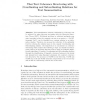4128 search results - page 74 / 826 » Learning and using relational theories |
CONTEXT
2007
Springer
2007
Springer
Thai Text Coherence Structuring with Coordinating and Subordinating Relations for Text Summarization
14 years 4 months ago
Text summarization with the consideration of coherence can be achieved by using discourse processing with the Rhetorical Structure Theory (RST). Additional problems on relational a...
ILP
2007
Springer
14 years 4 months ago
2007
Springer
Bias/variance analysis is a useful tool for investigating the performance of machine learning algorithms. Conventional analysis decomposes loss into errors due to aspects of the le...
ACL
1997
13 years 11 months ago
1997
We introduce a typed feature logic system providing both universal implicational principles as well as definite clauses over feature terms. We show that such an architecture suppo...
NIPS
1994
13 years 11 months ago
1994
The spatial distribution and time course of electrical signals in neurons have important theoretical and practical consequences. Because it is difficult to infer how neuronal form...
CEEMAS
2003
Springer
14 years 3 months ago
2003
Springer
Modeling learning agents in the context of Multi-agent Systems requires an adequate understanding of their dynamic behaviour. Usually, these agents are modeled similar to the diļ¬...

